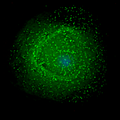PLOS Biology: Difference between revisions
m italicise journal name |
No edit summary |
||
| Line 16: | Line 16: | ||
| license = [[Creative Commons licenses|Creative Commons Attribution License]] |
| license = [[Creative Commons licenses|Creative Commons Attribution License]] |
||
}} |
}} |
||
'''''PLOS Biology''''' is an [[open |
'''''PLOS Biology''''' is an [[open-access]] [[Peer review|peer-reviewed]] [[scientific journal]] covering all aspects of [[biology]]. Publication began on October 13, 2003. |
||
It was the first journal of the [[Public Library of Science]]. All content in ''PLOS Biology'' is published under the [[Creative Commons]] "by-attribution" license. To fund the journal, the publication's [[business model]] requires that, in most cases, authors will [[Article Processing Charge|pay publication costs]]. |
It was the first journal of the [[Public Library of Science]]. All content in ''PLOS Biology'' is published under the [[Creative Commons]] "by-attribution" license. To fund the journal, the publication's [[business model]] requires that, in most cases, authors will [[Article Processing Charge|pay publication costs]]. |
||
Revision as of 08:34, 6 September 2014
 | |
| Discipline | Biology |
|---|---|
| Language | English |
| Edited by | Jonathan Eisen |
| Publication details | |
| History | 2003–present |
| Publisher | |
| Yes | |
| License | Creative Commons Attribution License |
| 11.77 (2013/14) | |
| Standard abbreviations | |
| ISO 4 | PLoS Biol. |
| Indexing | |
| ISSN | 1544-9173 (print) 1545-7885 (web) |
| Links | |
PLOS Biology is an open-access peer-reviewed scientific journal covering all aspects of biology. Publication began on October 13, 2003.
It was the first journal of the Public Library of Science. All content in PLOS Biology is published under the Creative Commons "by-attribution" license. To fund the journal, the publication's business model requires that, in most cases, authors will pay publication costs.
In addition to research articles, PLoS Biology publishes online e-letters in which readers provide comments on articles.
According to the Journal Citation Reports, the journal has a 2012 impact factor of 12.690, ranking it first in the category 'Biology'[1] and ranking it tenth in the category 'Biochemistry & Molecular Biology'.[2] Mike Taylor of Discover Magazine said in 2012 that while PLoS Biology has a high impact factor, "PLoS has de-emphasized this traditional, problematic measure, so you won’t find this fact blazoned across their website."[3]
The current editor-in-chief is Jonathan Eisen[4] from the University of California, Davis.
Gallery
Due to their free licensing, files from PLoS Biology can be reused in places other than the original article, e.g. to illustrate Wikipedia articles.
-
HIV attacking a macrophage.
-
A bat flying at night.
-
Specimens in a seedbank.
-
Pea aphids feeding on peas.
-
A bee performing its waggle dance.
-
An impression from a wildfire.
-
Haast's eagle attacking a moa.
References
- ^ "Web of Science". 2013. Retrieved 2013-06-20.
- ^ "Web of Science". 2013.
- ^ Taylor, Mike. "It’s Not Academic: How Publishers Are Squelching Science Communication." Discover Magazine. February 21, 2012. Retrieved on March 3, 2012.
- ^ Attention: This template ({{cite pmid}}) is deprecated. To cite the publication identified by PMID 18303952, please use {{cite journal}} with
|pmid=18303952instead.








